4 aug 2020
|
|
B’Tselem – The Israeli Information Center for Human Rights in the Occupied Territories: While the news is full of the plans to annex the West Bank and legalize construction in settlements – Israel is busy creating facts on the ground, as usual.
Annexation or not, Israel has been demolishing homes in the West Bank and trying to drive Palestinians out of their homes for decades. These attempts to take over the coveted land are carried out in utter indifference to the severe damage to Palestinians’ property, livelihood, water, and power supply infrastructure they set up themselves, and their ability to plan their lives. Some of these Palestinians are elderly, some are parents, and most of them own land. The one thing they do not have, which Israel makes sure they never will, is building permits. As they cannot build legally, these residents |
are forced to live in uncertainty, under constant threat that their homes will be demolished, their water and power supplies cut off, and their livelihoods taken away.
From the beginning of the year through May 2020, Israel demolished 30 houses and apartments throughout the West Bank (including East Jerusalem). As a result, 130 people have lost their homes, including 68 minors.
Another 112 non-residential structures (mostly cisterns and storage structures) were demolished. In East Jerusalem, 31 housing units were demolished, 26 of which were torn down by their owners after they received a demolition order. In total, 112 people, including 53 minors, lost their homes.
Build another room to alleviate crowding in your home? The Civil Administration will swiftly tear it down. Lay a pipe to carry water from a spring to a field?
The Civil Administration will soon slash it. Add a classroom to the community school? It will be destroyed. Install a toilet donated to the community to improve hygiene? It will be confiscated. Build a tabun oven to bake bread? Forbidden. Put in a solar panel to generate a bit of electricity? Not allowed.
If you build It, they will come.
1 June 2020 – a convoy approaching Khirbet ‘Alan in the Jordan Valley. The same day, the Civil Administration confiscated a water pump and other farming equipment from the community.
Military and Israel Police forces escort Civil Administration personnel on their mission. They often show up early in the morning, unannounced. The convoy of demolition machines slowly drawing near leaves no room for doubt. Once you spot it, you know – someone from our community will lose something today. The scope of loss and damage are revealed only after the last jeep leaves.
3 June 2020 – heavy machinery, Civil Administration personnel, soldiers and security guards go up to Khirbet al-Markez in the South Hebron Hills. The mission: demolish six homes built with EU funding. The result: 36 people, including 22 minors, homeless.
The South Hebron hills are mostly inhabited by farmers who live off agriculture and herding. For many years, Israel has been eyeing their land and trying to drive them out.
The European Union, which donates essential equipment and residential structures to Palestinian communities suffering confiscations and demolitions, has protested before Israel in the past about the confiscation and demolition of equipment it has provided. It has also warned that these actions will have implications for Israel-EU relations. Yet Israel continues with its demolition policy – without, as yet, any consequences.
11 May 2020, Khirbet ‘Alan, southwest of al-Jiftlik, the Jordan Valley. A military “stop-work” order issued to a community resident for an old cistern built without a permit – which is impossible to obtain in the first place.
Two community residents recently received “stop-work” orders for old cisterns used by farmers for many years.
The cisterns have not yet been demolished, but irrigation systems have been destroyed and water-pipes confiscated. Israel forbids the community’s residents from connecting to the water system, so they are forced to provide alone for themselves and their livestock. Some residents purchase water in tankers, while others transport water from nearby sources, and some collect water from pits and springs.
27 May 2020, Furush Beit Dajan, the Jordan Valley. A house under construction, owned by village residents, demolished.
The occupant was about to get married and planned on starting life with his family in their new home. Israel had other plans.
The sight of a brick pile where a house once stood is all too familiar to the community. This time, the demolition left a groom without a roof over his head and ruined the future he was planning for his new family.
Beit Hanina, East Jerusalem, 8 June 2020. The Jerusalem Municipality offers Palestinian residents of Jerusalem two options: to demolish their own homes or wait for the municipality’s heavy machinery to do it. The latter will force them to pay huge fines.
In this case, a family of five members demolished their own home, which was still under construction.
1 May 2020 – another self-demolition of a home in Beit Hanina. Here stood the home of a family of four.
9 June 2020 – The Abu Ghaliya community, east of Jerusalem. A truck dismantles and confiscates a wood-and-tin structure that was home to a family of 11, including four minors.
The Civil Administration confiscates tractors, solar panels, movable structures, and raw materials.
Once, it even confiscated two cows. Vehicles can be redeemed at a price, but confiscated structures and tents are not returned to their owners. Some of the crops confiscated by the Civil Administration are offered for auction. In at least once case, the Civil Administration tried to sell humanitarian equipment donated by the EU.
From the beginning of the year through May 2020, Israel demolished 30 houses and apartments throughout the West Bank (including East Jerusalem). As a result, 130 people have lost their homes, including 68 minors.
Another 112 non-residential structures (mostly cisterns and storage structures) were demolished. In East Jerusalem, 31 housing units were demolished, 26 of which were torn down by their owners after they received a demolition order. In total, 112 people, including 53 minors, lost their homes.
Build another room to alleviate crowding in your home? The Civil Administration will swiftly tear it down. Lay a pipe to carry water from a spring to a field?
The Civil Administration will soon slash it. Add a classroom to the community school? It will be destroyed. Install a toilet donated to the community to improve hygiene? It will be confiscated. Build a tabun oven to bake bread? Forbidden. Put in a solar panel to generate a bit of electricity? Not allowed.
If you build It, they will come.
1 June 2020 – a convoy approaching Khirbet ‘Alan in the Jordan Valley. The same day, the Civil Administration confiscated a water pump and other farming equipment from the community.
Military and Israel Police forces escort Civil Administration personnel on their mission. They often show up early in the morning, unannounced. The convoy of demolition machines slowly drawing near leaves no room for doubt. Once you spot it, you know – someone from our community will lose something today. The scope of loss and damage are revealed only after the last jeep leaves.
3 June 2020 – heavy machinery, Civil Administration personnel, soldiers and security guards go up to Khirbet al-Markez in the South Hebron Hills. The mission: demolish six homes built with EU funding. The result: 36 people, including 22 minors, homeless.
The South Hebron hills are mostly inhabited by farmers who live off agriculture and herding. For many years, Israel has been eyeing their land and trying to drive them out.
The European Union, which donates essential equipment and residential structures to Palestinian communities suffering confiscations and demolitions, has protested before Israel in the past about the confiscation and demolition of equipment it has provided. It has also warned that these actions will have implications for Israel-EU relations. Yet Israel continues with its demolition policy – without, as yet, any consequences.
11 May 2020, Khirbet ‘Alan, southwest of al-Jiftlik, the Jordan Valley. A military “stop-work” order issued to a community resident for an old cistern built without a permit – which is impossible to obtain in the first place.
Two community residents recently received “stop-work” orders for old cisterns used by farmers for many years.
The cisterns have not yet been demolished, but irrigation systems have been destroyed and water-pipes confiscated. Israel forbids the community’s residents from connecting to the water system, so they are forced to provide alone for themselves and their livestock. Some residents purchase water in tankers, while others transport water from nearby sources, and some collect water from pits and springs.
27 May 2020, Furush Beit Dajan, the Jordan Valley. A house under construction, owned by village residents, demolished.
The occupant was about to get married and planned on starting life with his family in their new home. Israel had other plans.
The sight of a brick pile where a house once stood is all too familiar to the community. This time, the demolition left a groom without a roof over his head and ruined the future he was planning for his new family.
Beit Hanina, East Jerusalem, 8 June 2020. The Jerusalem Municipality offers Palestinian residents of Jerusalem two options: to demolish their own homes or wait for the municipality’s heavy machinery to do it. The latter will force them to pay huge fines.
In this case, a family of five members demolished their own home, which was still under construction.
1 May 2020 – another self-demolition of a home in Beit Hanina. Here stood the home of a family of four.
9 June 2020 – The Abu Ghaliya community, east of Jerusalem. A truck dismantles and confiscates a wood-and-tin structure that was home to a family of 11, including four minors.
The Civil Administration confiscates tractors, solar panels, movable structures, and raw materials.
Once, it even confiscated two cows. Vehicles can be redeemed at a price, but confiscated structures and tents are not returned to their owners. Some of the crops confiscated by the Civil Administration are offered for auction. In at least once case, the Civil Administration tried to sell humanitarian equipment donated by the EU.
3 aug 2020
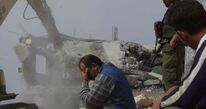
The Israeli occupation forces (IOF) on Sunday stormed Kafr ad-Dik town, west of Salfit, and handed local residents stop-work orders against nine homes and structures as a prelude to demolishing them.
Accordingly, the number of such military ultimatums against Palestinian property in this area has risen to 25 stop-work orders issued during one month.
The IOF also stormed the Bedouin areas of Ras al-Ahmar and al-Harsh in the west of Atouf hamlet in the northern Jordan Valley and delivered written demolition threats against homes and cattle shelters.
Accordingly, the number of such military ultimatums against Palestinian property in this area has risen to 25 stop-work orders issued during one month.
The IOF also stormed the Bedouin areas of Ras al-Ahmar and al-Harsh in the west of Atouf hamlet in the northern Jordan Valley and delivered written demolition threats against homes and cattle shelters.
1 aug 2020

The Israeli occupation forces (IOF) on Saturday delivered stop-work orders against Palestinian property in al-Walaja village in Bethlehem and confiscated a bulldozer in the northern Jordan Valley.
According to local sources, the IOF stormed Ein Juwaiza area in al-Walaja village, northwest of Bethlehem, and handed local residents notices ordering them to stop building homes, retaining walls and a water well.
The IOF also stormed Atouf Plains in the northern Jordan Valley, seized a Palestinian-owned bulldozer and chased another one in the same area.
The bulldozers were working for a water pipeline project in the area.
According to local sources, the IOF stormed Ein Juwaiza area in al-Walaja village, northwest of Bethlehem, and handed local residents notices ordering them to stop building homes, retaining walls and a water well.
The IOF also stormed Atouf Plains in the northern Jordan Valley, seized a Palestinian-owned bulldozer and chased another one in the same area.
The bulldozers were working for a water pipeline project in the area.
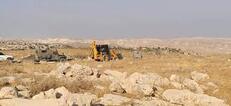
Israeli occupation forces obstructed today works for the construction of a water pipe in the village of Atouf, near the town of Tubas in the northeast of the occupied West Bank, according to local sources.
Mayor of the village, Abdullah Besharat, told WAFA that the Israeli occupation army ordered the driver of a bulldozer working on the site to briefly stop the works.
He added that the project aims at providing potable water to dozens of livestock and cattle breeders in Atouf and neighboring villages.
Mayor of the village, Abdullah Besharat, told WAFA that the Israeli occupation army ordered the driver of a bulldozer working on the site to briefly stop the works.
He added that the project aims at providing potable water to dozens of livestock and cattle breeders in Atouf and neighboring villages.
29 july 2020
|
|
Israeli forces Wednesday morning demolished the foundations of a house under construction in Beit Awwa town, south of Hebron city in the southern occupied West Bank, said WAFA correspondent.
He confirmed that Israeli forces raided the town, and demolished the foundation of the 150-meter-quare house purportedly for being built without a permit. The homeowner was identified as Mu‘ath Swaiti. Swaiti told WAFA that he received a military stop-construction notice, and his family appealed to an Israeli court to overturn the demolition order. We were surprised to see the demolition taking place although no court ruling was issued in this regard. |
According to a report by the Israeli human rights group B’Tselem, the Israeli High Court could be liable for war crimes for their policies that led to the dispossession of Palestinians from their properties in Area C of the West Bank.
The report [pdf], Fake Justice, shows that the court’s support of Israeli planning policy is tantamount to support for dispossession and forcible transfer of Palestinians, a war crime under international law.
Israel demolishes Palestinian houses and structures almost on a daily basis as a means to achieve “demographic control” of the occupied territories.
Israel denies planning permits for Palestinians to build on their own land or to extend existing houses to accommodate natural growth, particularly in Jerusalem and Area C, which constitutes 60 percent of the occupied West Bank and falls under full Israeli military rule, forcing residents to build without obtaining rarely-granted permits to provide shelters for their families.
In contrast, Israel argues that building within existing colonial settlements is necessary to accommodate the “natural growth” of settlers.
Therefore, it much more easily gives the estimated 550,000 Jewish Israeli settlers there building permits and provides them with roads, electricity, water and sewage systems that remain inaccessible to many neighboring Palestinians.
The report [pdf], Fake Justice, shows that the court’s support of Israeli planning policy is tantamount to support for dispossession and forcible transfer of Palestinians, a war crime under international law.
Israel demolishes Palestinian houses and structures almost on a daily basis as a means to achieve “demographic control” of the occupied territories.
Israel denies planning permits for Palestinians to build on their own land or to extend existing houses to accommodate natural growth, particularly in Jerusalem and Area C, which constitutes 60 percent of the occupied West Bank and falls under full Israeli military rule, forcing residents to build without obtaining rarely-granted permits to provide shelters for their families.
In contrast, Israel argues that building within existing colonial settlements is necessary to accommodate the “natural growth” of settlers.
Therefore, it much more easily gives the estimated 550,000 Jewish Israeli settlers there building permits and provides them with roads, electricity, water and sewage systems that remain inaccessible to many neighboring Palestinians.
28 july 2020
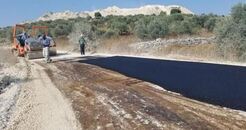
The Israeli occupation forces (IOF) on Monday prevented the Palestinian local authorities from paving a road in, south of Nablus.
Local official Ghassan Daghlas said that the IOF stormed the northern area of the town, detained a number of workers and supervisors as they were working on rehabilitating a road in Wadi ash-Sham area, and confiscated heavy-duty vehicles and equipment belonging to Brothers Company.
The IOF also brutalized a number of local landowners and citizens and confiscated their cellphones before taking the seized things to Gilad settlement.
Local official Ghassan Daghlas said that the IOF stormed the northern area of the town, detained a number of workers and supervisors as they were working on rehabilitating a road in Wadi ash-Sham area, and confiscated heavy-duty vehicles and equipment belonging to Brothers Company.
The IOF also brutalized a number of local landowners and citizens and confiscated their cellphones before taking the seized things to Gilad settlement.
24 july 2020
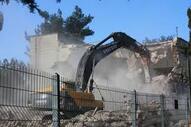
Israeli forces today delivered stop-construction orders for three houses in Beit Sakariya village, south of the southern West Bank city of Bethlehem, said a local activist.
Director of the Anti-Wall and Settlement Commission Hassan Briejah confirmed to WAFA correspondent that Israeli forces and officers of the so-called Israeli Civil Administration raided the village, and handed military stop-construction orders for three houses purportedly for lacking rarely-issued licenses.
The houses slated for demolition belong to Mohammad Atallah’s family.
Breijah added that the planned demolitions are part of Israel’s policy to limit the village’s urban expansion and seize its land to make room for the expansion of nearby Israeli colonial settlements.
Located nine kilometers to the south of Bethlehem city, Beit Sakariya, also known as Khirbet Beit Zakariya, has a population of some 150 and occupies a total area of 6,735 dunams.
Under the Oslo Accords, an agreement made 25 years ago that was supposed to last just five years towards a self-governing country alongside Israel, 100 percent of the village was classified as Area C, which falls under full Israeli control.
The village lies in the heart of the Israeli colonial settlement cluster, part of which comprises the Gush Etzion colonial settlement bloc. That’s why the villagers often suffer from the ongoing attacks and provocations of Israeli settlers, who attempt to seize their lands, uproot their trees and destroy their houses with the help of the Israeli military.
Israel has established six colonial settlements on land confiscated from the village. It has confiscated 2,350 dunams of the village land, accounting for 35 percent of the village total land. Israel has seized some 200 dunams for the establishment of a military camp, and further land for the construction of settler-only by-pass Road no. 60, 367 and 3698, which all extend for 4.5 kilometers on the village land.
Israel has constructed a section of the apartheid wall, isolating some 6724 dunams of fertile land, accounting for 99 percent of the village total area, for colonial settlement activities and pushing the villagers into a crowded enclave, a ghetto, surrounded by walls, settlements and military installations.
Director of the Anti-Wall and Settlement Commission Hassan Briejah confirmed to WAFA correspondent that Israeli forces and officers of the so-called Israeli Civil Administration raided the village, and handed military stop-construction orders for three houses purportedly for lacking rarely-issued licenses.
The houses slated for demolition belong to Mohammad Atallah’s family.
Breijah added that the planned demolitions are part of Israel’s policy to limit the village’s urban expansion and seize its land to make room for the expansion of nearby Israeli colonial settlements.
Located nine kilometers to the south of Bethlehem city, Beit Sakariya, also known as Khirbet Beit Zakariya, has a population of some 150 and occupies a total area of 6,735 dunams.
Under the Oslo Accords, an agreement made 25 years ago that was supposed to last just five years towards a self-governing country alongside Israel, 100 percent of the village was classified as Area C, which falls under full Israeli control.
The village lies in the heart of the Israeli colonial settlement cluster, part of which comprises the Gush Etzion colonial settlement bloc. That’s why the villagers often suffer from the ongoing attacks and provocations of Israeli settlers, who attempt to seize their lands, uproot their trees and destroy their houses with the help of the Israeli military.
Israel has established six colonial settlements on land confiscated from the village. It has confiscated 2,350 dunams of the village land, accounting for 35 percent of the village total land. Israel has seized some 200 dunams for the establishment of a military camp, and further land for the construction of settler-only by-pass Road no. 60, 367 and 3698, which all extend for 4.5 kilometers on the village land.
Israel has constructed a section of the apartheid wall, isolating some 6724 dunams of fertile land, accounting for 99 percent of the village total area, for colonial settlement activities and pushing the villagers into a crowded enclave, a ghetto, surrounded by walls, settlements and military installations.
17 july 2020
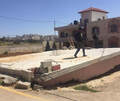
Israeli occupation authorities (IOA) on Thursday distributed notices ordering a halt to the construction of 15 Palestinian houses in Kafr ad-Dik town in the West Bank district of Salfit.
Kafr ad-Dik’s mayor Ebrahim Issa said in press statements that IOA crews, accompanied by armed soldiers, stormed the town in the morning and handed Palestinian citizens 15 orders to stop the construction of their houses in al-Sha’b neighborhood.
The IOA claimed the targeted houses are located in Area C, which is exclusively controlled by Israel based on the Oslo Accords in 1993.
Kafr ad-Dik has lost large areas of its land to Israeli settlements, military outposts, and industrial areas, and its residents are constantly subjected to settler attacks and targeted with demolition campaigns.
Kafr ad-Dik’s mayor Ebrahim Issa said in press statements that IOA crews, accompanied by armed soldiers, stormed the town in the morning and handed Palestinian citizens 15 orders to stop the construction of their houses in al-Sha’b neighborhood.
The IOA claimed the targeted houses are located in Area C, which is exclusively controlled by Israel based on the Oslo Accords in 1993.
Kafr ad-Dik has lost large areas of its land to Israeli settlements, military outposts, and industrial areas, and its residents are constantly subjected to settler attacks and targeted with demolition campaigns.
